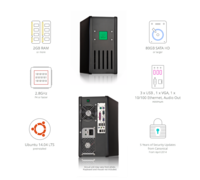drov
New Member
I found this today www.symplepc.com Has anyone used one of these?
Last edited by a moderator:

Not true.DDR/DDR2 RAM - Impossible to replace, high power usage.
The year-old screen I'm typing this on has HDMI but also VGA...most monitors I run into still have VGA.No HDMI/DVI - Useless with modern screens.
DDR/DDR2 RAM - Impossible to replace, high power usage.
Right now there are two major issues I see with the environment. Reducing (power usage) and re-using (older equipment). As you stated, they are conflicting ideals in technology because most of the time, newer equipment requires less input (power) and generates more output.I see no actual benefit from this.
They state utilizing Older outdated hardware longer would remove e-waste from the landfills and cut back on pollution (due to manufacturing costs). However, I wonder if they've ever considered the pollution involved in obtaining these old outdated hardware (Supply Chain problem) and additional pollution from the higher electricity usage. In addition, what actual practical use can we find for this? All I can think of is a high energy consuming thin client that can already be easily replaced (and cheaper) with an ODroid or a small ARM device as @KuJoe said.
Note, there will always be a high pollution/investment required during initial manufacturing, however long term energy "pollution" should also be considered.
If this was in Denmark or one of those countries that have invested much more energy to green-solutions then I can see this being a pretty nifty thing.
In my opinion, I think it's just all a marketing gimmick playing on being "environmentally conscience".
All fair enough points, however my main concern is the long-term impact of using outdated inefficient hardware. Of course a total analysis of the expected life-span of the product should be performed. At some time you'll hit the break-even point where the longer-term use of newer hardware has a higher benefit than reusing older hardware.Right now there are two major issues I see with the environment. Reducing (power usage) and re-using (older equipment). As you stated, they are conflicting ideals in technology because most of the time, newer equipment requires less input (power) and generates more output.
I guess the question comes down to what is most important. While it is possible to achieve both, by purchasing low voltage and power efficient products to start with and using them for as long as possible, it is not always economically feasible to do so.
In my opinion, reusing is more important than reducing and this will become more and more prevalent as time goes on.
1.) We have limited raw materials, we may be able to mine for them during our lifetime but what about the future generations.
2.) There is limited space in landfills. As time goes on, we will run out of space available for waste, unless we plan on destroying more ecosystems or living with waste in our backyard.
3.) There is enough renewable energy (without direct pollution) available between solar, wind, hydroelectric, geothermal, and biomass to power everything 100x over. The ability to tap into these energy sources is growing more and more each day.
